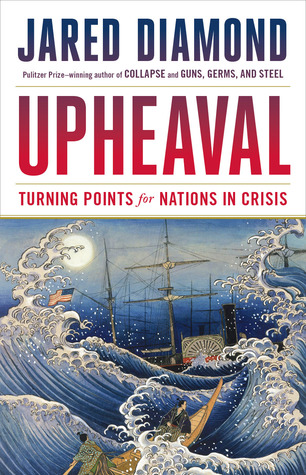More on this book
Community
Kindle Notes & Highlights
Successful coping with either external or internal pressures requires selective change. That’s as true of nations as of individuals.
Hence one can think of a crisis as a moment of truth: a turning point, when conditions before and after that “moment” are “much more” different from one another than before and after “most” other moments.
it’s the job of a book’s author, not of a book’s readers, to digest and prioritize life’s infinite complexity into a useful framework. I found that using a dozen factors offers an acceptable compromise between those two extremes:
Table 1.1. Factors related to the outcomes of personal crises 1. Acknowledgment that one is in crisis 2. Acceptance of one’s personal responsibility to do something 3. Building a fence, to delineate one’s individual problems needing to be solved 4. Getting material and emotional help from other individuals and groups 5. Using other individuals as models of how to solve problems 6. Ego strength 7. Honest self-appraisal 8. Experience of previous personal crises 9. Patience 10. Flexible personality 11. Individual core values 12. Freedom from personal constraints
Patience. Another consideration is the ability to tolerate uncertainty, ambiguity, or failure at initial attempts to change: in short, patience. It’s unlikely that a person in a crisis will figure out a successful way of coping on the first try. Instead, it may take several attempts, testing different ways to see whether they solve the crisis and whether they are compatible with one’s personality, until one finally finds a solution that works. People who cannot tolerate uncertainty or failure, and who give up the search
Any nation risks falling apart if its citizens do not feel joined by some unifying national ideology. Each nation has its own familiar ideals and phrases responding to that task of creating a unifying ideology. For example, American ideals have included democracy, equality, freedom, liberty, and opportunity, as captured in phrases such as “rags to riches,” “melting pot,” “land of liberty,” “land of equal opportunity,” and “land of unlimited possibilities.”
Thus, part—not all, but part—of the reason for Japan initiating World War Two against such hopeless odds was that young army leaders of the 1930’s lacked the knowledge base and historical experience necessary for honest, realistic, cautious self-appraisal. The result was disastrous for Japan.
Gallipoli became viewed as the birth of the Australian nation, reflecting the widespread view that any nation’s birth requires sacrifice and the spilling of blood.
The slaughter at Gallipoli symbolized the national pride of Australians, now fighting for their British motherland as Australians, not as Victorians or Tasmanians or South Australians—and the emotional dedication with which Australians publicly identified themselves as loyal British subjects.
Predictive factors—Are crises necessary?—Roles of leaders in history—Roles of specific leaders—What next?—Lessons for the future
Accept responsibility; avoid victimization, self-pity, and blaming
National identity. Of the dozen outcome predictors for individual crises, some translate readily into predictors of national crises. One that doesn’t readily translate is the individual characteristic of “ego strength,” which instead serves as a metaphor to suggest a related national characteristic: sense of national identity. What is national identity? It means shared pride in admirable things that characterize one’s nation and make it unique. There are many different sources of national identity, including language, military accomplishments, culture, and history. Those sources vary among
...more
Do countries require a crisis to motivate them to act, or do nations ever act in anticipation of problems?
Do leaders make a difference?
At the one extreme is the so-called “Great-Man” view of the British historian Thomas Carlyle (1795–1881), who asserted that history is dominated by the deeds of great men, such as Oliver Cromwell and Frederick the Great. Similar views are still common today among military historians, who tend to emphasize the decisions of generals and wartime political leaders.
At the opposite extreme was the author Leo Tolstoy, who maintained that leaders and generals had minimal influence on the course of history. To make his point, Tolstoy included in his novel War and Peace fictitious accounts of battles in which generals issue orders, but the orders are irrelevant to what is actually happening on the battlefield.
That view, that history’s course depends upon lots of details rather than on policies or decisions of great men,...
This highlight has been truncated due to consecutive passage length restrictions.
A pessimist might also respond, “Yes, sadly we do often ignore the obvious, but a book can’t change that blindness.
Thucydides’ Melian Dialogue has already been available to us for over two millennia, yet nations still make the same mistakes. What good can yet another book do?”
Today, at age 81, Jared is still teaching geography to UCLA undergraduates, with no plans to retire.


